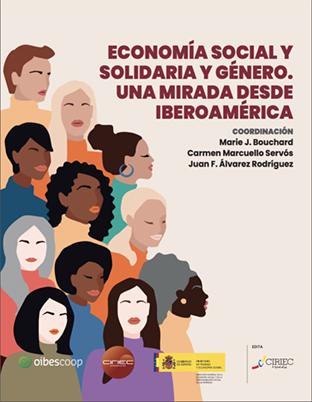A new study by OIBESCOOP and CIRIEC has been published, which expands the work on a highly topical subject that is arousing great interest among women researchers in the co-operative movement and the social economy: the issue of gender inequality. The study, entitled ‘Economía Social y Solidaria y Género, una mirada desde Iberoamérica’, is a collective work carried out by a group of 35 experts from the OIBESCOOP Network and CIRIEC International, from 10 countries, coordinated by the President of OIBESCOOP, Carmen Marcuello (University of Zaragoza, Spain); the President of the Scientific Commission of Social and Cooperative Economy of CIRIEC-International, Marie J. Bouchard (Université du Québec à Montréal, Canada), and Juan Fernando Álvarez (Pontificia Universidad Javeriana, Colombia).
This new study builds on the one presented in 2022, also by OIBESCOOP and CIRIEC, on Women, Cooperativism, and Social and Solidarity Economy in Ibero-America (“Mujeres, cooperativismo y economía social y solidaria en Iberoamérica”). The objective of that book was to acknowledge the work done by different women and/or women’s collectives based on their impact and influence on cooperativism and social and solidarity economy in the various territories of Ibero-America, across professional, research, entrepreneurship, or project leadership domains. From that effort emerged the idea of structuring a Working Group within CIRIEC International, in collaboration with OIBESCOOP, on the Gender theme.
The book now published is one of the outcomes of this new Working Group and highlights the potential of SSE but also the challenges it must confront by identifying a set of organizational practices aimed at building social changes.
The work includes twelve papers where the gender approach is debated from a territorial perspective, while delving into the leading role of women. The papers were selected following a call for contributions from OIBESCOOP, and particularly showcase the importance of women and gender minorities in the creation and management of socio-economic organizations, while generally remaining distant from formal power structures.
Four major sub-themes are developed in the book. On one hand, there are works addressing the responsibility of institutions in promoting the gender perspective. Thus, Argentina analyzes the role of universities, and Uruguay studies women’s participation as a driving force for change in agrarian cooperativism.
In another group of works, the role of participation in the company is analyzed, with cases such as ejidos in Mexico, or in territories like Santa Catarina, Brazil.
Another group of works examines the path women have taken within the movement underlying the social and solidarity economy sector. This is the case of Paraguay, where the role of female leadership is analyzed as a generator of a renewed cooperative movement; or Peru, in artisanal environments, or Costa Rica, as a source of resilience within a framework of relationships with university institutions.
Finally, another group of works contributes to action for change. These are the cases of Spain, or labor formalization through social economy in Chile.
The entire book can be downloaded here: https://www.oibescoop.org/wp-content/uploads/ES-y-Solidaria-y-Genero.pdf







